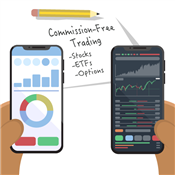Robinhood vs Acorns vs Webull
Robinhood, Acorns, and Webull can all help you invest your money. But which one is best for you? Read on to find out.
 |
Robinhood, Acorns, and Webull are all popular trading apps, but each one caters to a different type of investor.
Do you like choosing your investments, and doing your own research, or do you want to be hands-off?
This detailed comparison will help you choose which aligns best with your trading style and goals.
$20 Investment Bonus
- Open an Acorns account (new users only)
- Set up the Recurring Investments feature
- Have your first investment be made successfully via the Recurring Investments feature
Fund Account and Get Up to $12,000 Bonus
Open a new eligible Webull account. Fund the account with one or more qualifying deposits totaling $5,000 or more. Maintain a net qualifying funding amount of at least $5,000 in the account until the payment of the final installment of the offer reward. The offer reward will be credited to the eligible Webull account in 12 equal monthly installments, with the first installment issued within 45 days after the end of the offer period. To participate in this offer, you must click “Enroll Today” on the website. Terms and conditions apply.
| Net Qualifying Funding Amount | Offer Reward Amount |
|---|---|
| $5,000 - $25,000.99 | $100 |
| $25,001 - $100,000.99 | $750 |
| $100,001 - $250,000.99 | $1,500 |
| $250,001 - $500,000.99 | $3,750 |
| $500,001 - $1,000,000.99 | $5,000 |
| $1,000,001 - $5,000,000.99 | $8,000 |
| $5,000,001+ | $12,000 |
Who Each Is Best For
- Robinhood is best for investors who are just starting out or don't have a lot of capital to invest. You can trade stocks, ETFs, options, and cryptocurrencies with as little as $1.
- Acorns is a robo-advisor that's best for hands-off investors. For a monthly subscription fee, the platform will do all the hard work and invest for you.
- Webull is best for active traders and experienced investors who like to do in-depth research. The platform is known for its advanced charting and technical analysis tools.
 |  |  | |
| Visit Site | Visit Site | Visit Site | |
Robinhood | Acorns | Webull | |
|---|---|---|---|
Get a Free Stock (worth between $5 and $200) - | $20 Investment Bonus - | Fund Account and Get Up to $12,000 Bonus - | |
Benefits and Features | |||
| Savings | |||
| Stock Trading | Part of service fee. No add-on trading fees. | ||
| Options Trading | |||
| Annual Fee |
| ||
| Cryptocurrency Trading | |||
| Minimum Deposit | |||
| Checking | |||
| Mutual Fund Trading | |||
| Commission Free ETFs | All U.S. listed ETFs | A selection automatically chosen by Acorns | |
| Phone Support | |||
| Live Chat Support | Available 24/7 (requires sign in) | ||
| Email Support | Yes (customerservices@webull.us) | ||
| Human Advisors | |||
| Robo Advisor | |||
| Assets Under Management | |||
| Tax Loss Harvesting | |||
| Goal Tracker | |||
| Automatic Deposits | |||
| Broker Assisted Trades | Acorns automatically invest and trade for you | ||
| Good For | Beginners; Passive investors; Those who have trouble saving/investing on their own | Experienced investors; Active traders | |
| Inactivity Fee | None, but you will keep paying the monthly fee | ||
| Maintenance Fee | |||
| Online Platform | |||
| iPhone App | Yes (4.7 stars, 296.2k ratings) | ||
| Android App | |||
| Banking | Offers Robinhood spending account with Robinhood Cash Card issued by Sutton Bank | Included in Acorns Bronze ($3/mo). Free metal debit card, no minimum balance, no overdraft fees, and 55,000+ fee-free ATMs nationwide. | |
| Mobile App | |||
| Two-Factor Authentication | Device approvals, Authenticator app, SMS | ||
| Forex Trading | |||
| Futures Trading | |||
| Locations | |||
| Online Community | |||
| Seminars | |||
| Virtual Trading | Yes. Free paper trading account with unlimited fake money | ||
| Fractional Shares | |||
| Taxable Accounts | |||
| 401k Plans | |||
| IRA Accounts | |||
| Roth IRA Accounts | |||
| SEP IRA Accounts | |||
| Trust Accounts | |||
| 529 Plans | |||
| Visit Site | Visit Site | Visit Site | |
Blank fields may indicate the information is not available, not applicable, or not known to CreditDonkey. Please visit the product website for details. Robinhood: Pricing information from published websites as of 01/25/2025. Acorns: Pricing information from published website as of 11/29/2024. | |||
What All Three Offer
- Commission-free trading
- No minimum deposits to open an account
- Fractional shares
- High-performing mobile apps
How They're Different
- Robinhood and Acorns are more tailored towards beginners, while Webull is better for experienced investors.
- Robinhood and Webull are DIY investing apps. Acorns is a robo-investor that offers automated investing.
- Acorns has a monthly fee, while Robinhood and Webull are completely free to start using.
- Acorns only lets you invest in pre-built portfolios of ETFs and certain individual stocks. The other two let you choose your own stocks, options, and ETFs.
Why Choose Robinhood?
Robinhood offers 100% commission-free trading. You can invest in stocks, ETFs, options, and cryptocurrencies for as low as $1. This makes it perfect for new investors who want to start with small amounts.
Robinhood also offers IRA that matches your contributions.[2] This gives you a nice little boost to your retirement savings.
For more experienced investors, they have a premium account called Robinhood Gold at $5/month. With it, you get bigger instant deposits, more advanced research tools, and an even higher percentage match on your IRA contributions.
Robinhood has over 20 million users. The app is very beginner-friendly and highly-rated on both Google Play and App Store.
Drawbacks:
The biggest drawback of Robinhood is that its research isn't the most extensive.
You get access to professional research from Morningstar with Robinhood Gold, but you'll need to pay their monthly fee for that. Even then, it's not as extensive as Webull's array of tools.
Pros + Cons:
|
|
Why Choose Acorns?
Acorns is a robo-advisor that's perfect for hands-off investors. From picking investments to balancing your portfolio, the platform does all the heavy lifting for you.
You can link your credit/debit cards, and Acorns will round up your purchases and invest the change.[4] As soon as the spare change amounts to $5, it gets invested into an expert-built portfolio of ETFs.
As soon as you sign up, Acorns will recommend diversified portfolios. From there, you can pick one depending on how aggressive you want to be.
Drawbacks:
Investment options are more limited. The automated investing account only invests in ETFs. You can buy individual stocks if you have the Gold plan, but the choices are limited to larger companies.
If you're looking for big returns, Acorns likely won't be aggressive enough for you. Even the most aggressive options may still be on the more conservative side for many.
Pros + Cons:
|
|
Yes. Because of how safe and conservative the investment options are on Acorns, people have made money. However, returns on Acorns are seen in the long-term compared to the active trading options seen on Robinhood or Webull.
$20 Investment Bonus
- Open an Acorns account (new users only)
- Set up the Recurring Investments feature
- Have your first investment be made successfully via the Recurring Investments feature
Why Choose Webull?
Webull is for more advanced, active traders. It offers commission-free trades on stocks, ETFs, and options.[5]
On top of that, they offer widely praised advanced charting tools and stock screeners. They also have great technical analysis tools to help you make your investment decisions.
Webull has features for different types of traders:
- For day traders: Perform up to 3 day trades in a five-trading day period (unlimited for those with $25,000 or more in account balance).[6]
- For margin traders: Get access to margin trading at no extra cost and up to 4x buying power (you need at least $2,000 to qualify).[7]
- For short sellers: Short selling is supported on Webull.
Webull is also the only platform among the three that offers a paper trading account. You get unlimited virtual cash and real-time market data, so you can test your strategies before committing real money.
Drawbacks:
If you're a complete beginner, you may find all the research tools overwhelming. All the charts and screeners and could scare you away from trading completely.
Pros + Cons:
|
|
Webull is better for more experienced traders while Robinhood caters to beginners. While both allow you to trade similar assets, Webull has more advanced research and analysis tools compared to Robinhood.
Fund Account and Get Up to $12,000 Bonus
Open a new eligible Webull account. Fund the account with one or more qualifying deposits totaling $5,000 or more. Maintain a net qualifying funding amount of at least $5,000 in the account until the payment of the final installment of the offer reward. The offer reward will be credited to the eligible Webull account in 12 equal monthly installments, with the first installment issued within 45 days after the end of the offer period. To participate in this offer, you must click “Enroll Today” on the website. Terms and conditions apply.
| Net Qualifying Funding Amount | Offer Reward Amount |
|---|---|
| $5,000 - $25,000.99 | $100 |
| $25,001 - $100,000.99 | $750 |
| $100,001 - $250,000.99 | $1,500 |
| $250,001 - $500,000.99 | $3,750 |
| $500,001 - $1,000,000.99 | $5,000 |
| $1,000,001 - $5,000,000.99 | $8,000 |
| $5,000,001+ | $12,000 |
Direct Comparison
To give you a better idea of which platform will suit your trading style, here's a direct comparison between Robinhood, Acorns, and Webull.
Robinhood and Webull make their money through methods like payment for order flow (PFOF), margin interest, and income from uninvested cash.
On top of that, Robinhood has membership fees for Robinhood Gold and interchange fees from their cash card account. Acorns, on the other hand, earns all their money via subscription fees.
Fees
 |  |  | |
| Visit Site | Visit Site | Visit Site | |
Robinhood | Acorns | Webull | |
|---|---|---|---|
Get a Free Stock (worth between $5 and $200) - | $20 Investment Bonus - | Fund Account and Get Up to $12,000 Bonus - | |
| Stock Trading | Part of service fee. No add-on trading fees. | ||
| Options Trading | |||
| Cryptocurrency Trading | |||
| Annual Fee |
| ||
| Inactivity Fee | None, but you will keep paying the monthly fee | ||
| Maintenance Fee | |||
| Visit Site | Visit Site | Visit Site | |
Robinhood: Pricing information from published websites as of 01/25/2025. Acorns: Pricing information from published website as of 11/29/2024. | |||
All three platforms have no account minimums and offer commission-free trading.
Robinhood and Webull have no fees to maintain your account, while Acorns has a monthly fee since it's a robo-advisor. The fees are:[8]
- Acorns Bronze ($3/mo) - includes personal taxable account, IRA, and checking account
- Acorns Silver ($6/mo) - includes everything in Bronze, emergency fund, 25% match on rewards, and 1% IRA match on Acorns Later contributions
- Acorns Gold ($12/mo) - includes everything in Silver, investment accounts for kids, 50% match on rewards, custom portfolio, Trust & Will, $10K Life Insurance, free Acorns Early account, and 3% IRA match on Acorns Later contributions
Robinhood also has an optional Premium account called Robinhood Gold that costs $5/month. This gives you higher interest on uninvested cash, the first $1,000 of margin with no interest, and professional research from Morningstar.
Minimum Investment
There is no minimum to open an account with all three platforms. And they all offer fractional shares so you can get started with just dollars.
Robinhood offers fractional shares from $1, while Webull lets you invest starting as low as $5.[9]
Acorns requires an initial investment of $5. If you're investing your spare change through their Round-Ups feature, the total needs to equal to $5 before it gets invested.[10]
Ease of Use
Acorns is easiest to use since it's completely hands-off. They do everything for you—from picking the investments to managing your portfolio. With recurring deposits and spare change round-ups, you can literally "invest without thinking."
If you want to invest yourself, Robinhood is great for beginner investors. They have an incredibly intuitive user interface that allows anyone to just pick it up and start trading.
Since Webull is more geared toward active traders, it has a steeper learning curve. They offer more comprehensive research tools that could be overwhelming for beginners. But there is a free paper trading account for practice.
Tradable Assets
| Robinhood | Acorns | Webull | |
|---|---|---|---|
| Stocks | ✔ | ✔ | ✔ |
| ETFs | ✔ | ✔ | ✔ |
| Options | ✔ | - | ✔ |
| Cryptocurrency | ✔ | - | - |
| Mutual funds | - | - | - |
| Bonds | - | - | - |
Robinhood and Webull let you choose your own stocks, ETFs, and options. Robinhood even offers cryptocurrencies. However, they don't offer mutual funds, bonds, futures, or forex.
Acorns, on the other hand, is a robo-advisor. This means that you're only investing in ETFs from prebuilt portfolios. You can see what's included in the portfolios, but the only choice you have is how aggressive you want to be.
In mid-2023, Acorns introduced Custom Portfolios, which allows Gold subscribers to choose individual stocks.[11] However, the stocks are limited to large companies in the U.S.
Acorns is better for hands-off, passive investors, while Robinhood is better for DIY investors. Acorns is also better for longer-term investors, while Robinhood is better for active traders. Both trading apps are very beginner-friendly.
Account Types
| Robinhood | Acorns | Webull | |
|---|---|---|---|
| Individual taxable account | ✔ | ✔ | ✔ |
| Joint account | - | - | - |
| Traditional IRA | ✔ | ✔ | ✔ |
| Roth IRA | ✔ | ✔ | ✔ |
| Margin account | ✔ | - | ✔ |
| 529 College Savings | - | - | - |
| Account for minors | - | ✔ | - |
| Checking account | - | ✔ | - |
| Paper trading account | - | - | ✔ |
Robinhood offers a unique IRA that matches a percentage of your contributions. The match is even higher for those with a Gold membership.
For experienced investors looking to trade on margin, Webull may be best. From the get-go, you have access to margin trading with up to 4x buying power.
Acorns is more of an all-in-one type of platform. Not only can you create an investing account, but you can also create a checking account. They also offer an account for minors, which means your whole family can invest with Acorns. They will also match your contributions to your Acorns Later retirement account.
A margin account lets you borrow money against the value of your securities. A cash account, on the other hand, only allows you to use the money you have on hand for investing. Both are the primary types of accounts on most brokerages.
1% Match on IRA
Earn 1% IRA match on all eligible contributions to your Robinhood IRA. Terms and conditions apply. This is a limited-time offer.
3% Match on IRA with Robinhood Gold
Earn 3% IRA match on all eligible contributions with Robinhood Gold. Terms and conditions apply. This is a limited-time offer.
Trading Process
Robinhood and Webull are DIY apps where you do the trading yourself. You choose which security you want and how much of it you want to buy. From there, you execute the orders yourself using the order type you want.
Robinhood only provides the basic types of orders, making it better suited for those with simpler investment strategies.
Webull, on the other hand, provides more advanced conditional orders. These give experienced investors more control over their trades to mitigate risk.
| Order Type | Robinhood | Webull |
|---|---|---|
| Market order | ✔ | ✔ |
| Limit order | ✔ | ✔ |
| Stop limit | ✔ | ✔ |
| Stop loss | ✔ | ✔ |
| Trailing stop loss | ✔ | ✔ |
| Trailing stop limit | - | ✔ |
| One-triggers-the-other (OTO) | - | ✔ |
| One-cancels-the-other (OCO) | - | ✔ |
| One-triggers-an-OCO (OTOCO) | - | ✔ |
With Acorns, there's no need to fill out any order forms to invest. The platform automatically invests in ETFs for you. You just choose your risk level, and Acorns will do all the heavy lifting for you.
If you have a Gold plan, you can invest in an individual stock or ETF from their list. However, it's worth noting that these purchases are not in real-time.
When you decide to buy an individual stock, Acorns will buy it on your behalf 1-3 business days after your next cash investment.
Educational And Research Tools
Webull has the most extensive research tools, while Acorns doesn't offer any. Here's how they break down:
Robinhood
Because it's made with beginners in mind, Robinhood only has the basic research tools like:
- Side-by-side stock comparisons and stock filters
- Real-time market updates on stocks in your watch list
- Candlestick charts with 5 indicators
- Prices paid by Robinhood investors (per share)
If you have a Gold account, you'll get access to professional research from Morningstar. These include in-depth stock research reports, covering over 1,700 stocks, and are frequently updated.
- Business strategy - Initiatives a company takes to create value
- Economic moat - Ability to maintain an edge over its competitors
- Fair market value - The price the company would sell for on an open market
- Risk - Probability of losing parts or all investments in the company
- Leadership -The people behind the company, specifically management
Acorns
Because Acorns is a robo-advisor, there's no need for you to do in-depth research. Other than their Learn section, there aren't many research tools at your disposal.
If you're a Gold member, you get quarterly in-depth analysis of markets and economic climate reports. But that's pretty much it.
Webull
Webull has the most advanced research and charting tools that help you make informed investment decisions. This includes:
- Real-time market quotes
- Price alerts (for stocks on your watchlist)
- Stock screeners
- Market data from 5 categories and 100+ exchanges
- 50 technical indicators
- Analyst ratings
- Video replay (for historical stock price action)
Webull has the most extensive resource library. Their learn section offers educational resources like webinars, tutorials, and articles that span a wide range of topics.
If you need advanced research tools or a paper trading account to practice with, Webull is a better option. If you're just starting out, Robinhood's user-friendly interface may be more suited for you.
Security/Compliance
Robinhood, Acorns, and Webull are all SIPC-insured. This means up to $500,000 (including a $250,000 cash limit) is insured in case the brokerage fails. [12]
These platforms also have supplemental coverage for amounts that exceed SIPC limits. Robinhood uses Lloyd's of London while Webull uses Apex Clearing.
All three platforms also have data encryption, security protocols, and two-factor authentication (2FA), all of which protect your private and personal data.
In terms of compliance, all three platforms have regulatory oversight. They all also comply with KYC/AML laws.
Know Your Customer (KYC) refers to checks that companies make to ensure that their customers are who they say they are and aren't a risk to the business. Anti-Money Laundering (AML) refers to the steps that companies take to prevent criminals from transferring funds that came from illicit activity.
Customer Support
All three platforms have available customer support to help you with any concerns or questions you may have:
- Robinhood: 24/7 via live chat and phone[13]
- Acorns: 24/7 via live chat and email; Phone available from 5:00 am to 7:00 pm (PST), 7 days a week[14]
- Webull: 24/7 via email and phone[15]
Mobile App
Here's a quick overview of their ratings on the mobile app stores:
| Robinhood | Acorns | Webull | |
|---|---|---|---|
| Google Play | 4.1/5 stars (475,000+ ratings) | 4.6/5 stars (280,000+ ratings) | 4.3/5 stars (189,000+ ratings) |
| App Store | 4.2/5 stars (4.1+ million ratings) | 4.7/5 stars (893,000+ ratings) | 4.7/5 stars (297,000+ ratings) |
In terms of customer feedback, here are some comments from their app store reviews:
Robinhood
Acorns
Webull
Bottom Line
The best platform for you will heavily depend on the type of investor you want to be.
Robinhood is best for beginner DIY investors just starting out, while Webull is good for experienced, active traders who depend on research.
And if you don't want to pick your own investments or manage your own portfolio at all, Acorns is great for passive investors.
References
- ^ TechCrunch. Robinhood App Will Offer Zero-Commission Stock Trades Thanks To $3M Seed From Index and A16Z, Retrieved 10/16/2023
- ^ Robinhood. IRA match FAQ, Retrieved 10/16/2023
- ^ FINRA. FINRA Orders Record Financial Penalties Against Robinhood Financial LLC, Retrieved 02/05/2024
- ^ Acorns. What Are Real-Time Round-Ups, Retrieved 11/11/2023
- ^ Webull. What Are The Trading Fees On Webull? Are You Commission Free?, Retrieved 10/30/2023
- ^ Webull. What's The Difference Between Margin And Cash Account?, Retrieved 10/30/2023
- ^ Webull. Margin Trading, Retrieved 10/30/2023
- ^ Acorns. Acorns Subscriptions, Retrieved 12/09/2023
- ^ Webull. Fractional Shares, Retrieved 11/11/2023
- ^ Acorns. Is there a minimum investment required to open an account?, Retrieved 10/16/2023
- ^ Acorns. New Custom Portfolios: Choose Your Acorns Investments, Retrieved 10/16/2023
- ^ SIPC. Investor Protection, Retrieved 10/16/2023
- ^ Robinhood. How to contact support, Retrieved 11/16/2023
- ^ Acorns. Acorns Contact Information, Retrieved 12/09/2023
- ^ Webull. How to File an Inquiry?, Retrieved 11/16/2023
Write to Iggi Vargas at feedback@creditdonkey.com. Follow us on Twitter and Facebook for our latest posts.
Note: This website is made possible through financial relationships with some of the products and services mentioned on this site. We may receive compensation if you shop through links in our content. You do not have to use our links, but you help support CreditDonkey if you do.
|
|
| ||||||
|
|
|







